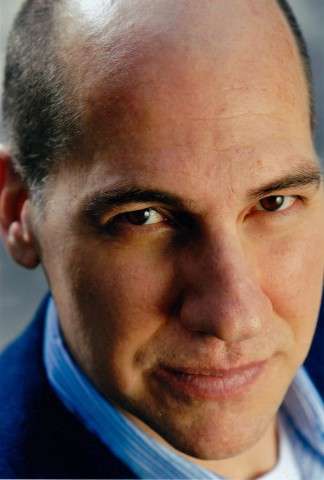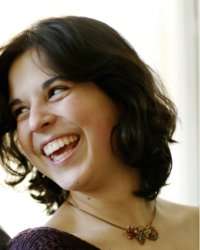|
Back
The Wit orf Brevity New York
ZankelHall, Carnegie Hall
10/19/2012 -
Seymour Barab: All Mine
Benjamin Bierman/Earl Shuman: Come to Spain
Richard Burke: The Sacred Wood
Randolph Coleman/Lawrence George: Threnody
Carlisle Floyd: Pilgrimage
Bern Herbolsheimer: Quartet
Christian McCleer: Puppeteer
David Morneau/Brantley Aufill: Ballad of Milt Famey
Graham Robb/Jim Stewart: Flora and the Prince
Patrick Soluri/Royce Vavrek: Polka
Christopher Trakas, Dewey Moss (Baritones), Danya Katok, Laura Pedersen, Monica Harte (Sopranos), Laura Federici (Mezzo-Soprano), Ransom Bruce, Jamie Ignao (Tenors)
Philip Ewell (Cello), Karen Rostron, Regi Papa (Violins), Joel Rudin (Viola), Jacquerline Martelle (Flute), Jay Hassler (Clarinet), Emanuel Bierman (Cajón), Christian McLeer, Jonathan Levin, Kelly Horsted, Azamat Sydykov, William McNally (Pianists and Conductors)

C. Trakas (© Courtesy of the Artist)
So along with the names Puccini and Bellini, Verdi and Rossini, add the name Brevíti.
Brevíti?? Uh... no, actually it was operatic brevity. The so-appropriately-named "Remarkable Opera Brigade" presented a decalogue of operas last night, which ranged in time from 4 minutes to about 12 minutes. And while relatively brief, I hesitate calling them "mini-operas." They were musically, literarily and at times, emotionally complete in themselves.
The ten operas were a remarkable buffet of moods and stories. They ranged from a four-minute barnyard joke so corny it would be thrown out by Grand Ol’ Opry. In the same line was a baseball opera ending with a complicated, outrageous pun. On the other side, three short operas were of biting import. One was the monologue of professor and advocate of civil rights, dying of Lou Gehrig’s Disease, another the litany of a "pilgrim" who travels from the austerity of the Old Testament to a euphoric praise of the Lord to a hymn of love. And one was a man in a loony bin
In between were plots which roamed the world. Here was the retelling of an ancient Scots myth, and ancient Greek myth, a mad cat-fight based on the polka, and a quartet of animals attempting to make music. As well as an aria sung by a bullfighter and the bull (both played by tenor Edwin Vargas).
Three of the ten works were monodramas more than operas. As expected, the most renowned of the composers, Carlisle Floyd’s Pilgrimage, written 57 years ago, was a gripping piece, a religious litany taking the "Man", played by Christopher Trakas, on a religious journey from the most austere Old Testament tortures to an unceasing praise of God to the apotheosis, a love of God. Accordingly, the music began with linear, bristly lines, graduating to something approaching a hymn and finally a kind of euphoric music as he is led off the stage.

C. McCleer (© Remarkable Theater Brigade)
By far, my own favorite work was another monodrama, Puppet, by Christian McCleer, who wrote music and libretto and was musical director for virtuoso performance by Dewey Moss. The site was an insane asylum, where "Isaac", sung and danced and strutted by Mr. Moss, goes seamlessly from a self-consciousness in the asylum, his endless "pills" resembling strings of "pearls" to the illusion that he is the world’s greatest puppeteer. And here, with hand puppet, Mr. Moss strutted a razzmatazz show hit, danced, roved around the stage, and then back to insanity again.
But a self-conscious insanity. One could say this was a metaphor for the Artist-any artist-but Mr. McCleer wrote a profile of such verbal and acting brilliance that it stood on its own.
Touching and fairly comedic was Richard Burke’s The Sacred Wood, one of two operas about an American couple abroad. Here, the couple find themselves in a one-time sacred wood, asking the trees to help them make a decision whether to continue together. The four lady "trees" answer with a subtle extending of branches, while the string quartet played the soothing reply.

D. Katok (© Courtesy of the Artist)
I personally loved the first opera, Quartet, with four animals, dressed monkey, goat, donkey and bear, pretend to be musicians. Asks librettist (and composer) Bruce Herbolsheimer. "How do you do it?" Quite simple. The animals have have instruments (check!), march in a straight line (check!) play the music (check!)...but something is wrong. Their words are farcically terrific, the string quartet-piano is rollicking enough.
But when the Nightingale, Danya Katok, flies in, she needs no instructions. The music is instinctive and beautiful, as the animals all agree. A lovely piece.
Each opera had its joys. David Morneau’s Ballad of Mitt Faney (wth that unspeakable pun) had a simple Ragtime rhythm, and a happily prissy way with the dirtiest words. Polka was a wedding cat-fight, staged with brutal realism. Threnody celebrated the life of Stephen Gey, the real-life professor who died of Gehrig’s Disease, and whose brave and tortured passing was recorded in the only opera which fringed on atonality.
For these operas were all conservative, lyrical, staged well (though lacking intimacy on the large stage of a half-filled Zankel Hall) and played with musicians and directors that did credit to each work.
One could have imagined that ten short operas would have blurred into one another. But these composers had chosen singular stories with singular music, offering not only perpetual surprises, but frequently, a unique wit of brevity.
Harry Rolnick
|